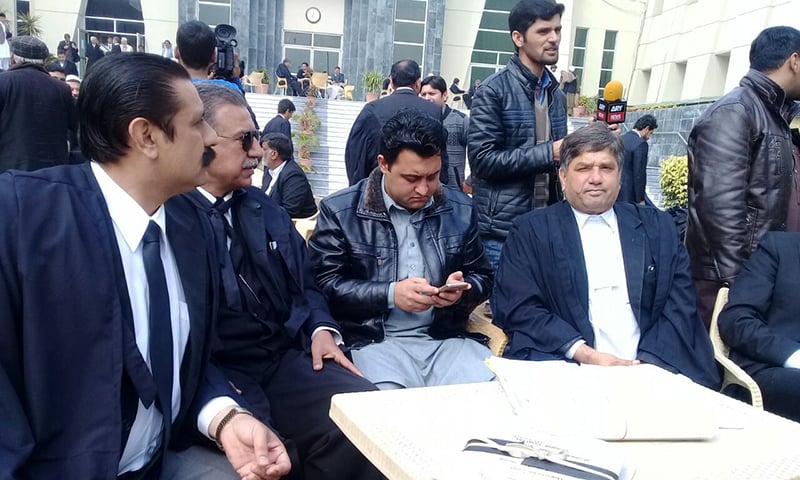News Analysis |
On Wednesday, Mashal Khan’s family filed an appeal against Anti-Terrorist Court’s (ATC) verdict on the Mashal Khan lynching case. The appeal filed by Mashal Khan’s brother Aimal Khan who argues that the decision given by Haripur’s ATC should be reversed and the twenty-six people acquitted by the ATC should be awarded capital punishment.
An ATC court in Haripur had announced its verdict on the Mashal Khan lynching case on 7th February. Among the 61 suspects, one person had been given the death sentence, five were given 25 years in prison, another 25 were jailed for four years and 26 suspects were acquitted without punishment.
The bigger issue at hand is the undue praise of the killers of Mashal Khan. Media analysts believe that they might be on the path to achieve the same status as the notorious and revered Mumtaz Qadri, killer of the former Governor of Punjab, Salman Taseer.
The appeal states that the 26 acquitted were received by a cheering crowd on returning to their hometown after release from custody. In which they also admitted to the charges levelled against them in front of the crowd. ‘It would encourage respondents to commit such acts in the future,’ argued the appeal. A video recording of this exists.
The appeal states that the golden principle of Qiyas was being violated in the verdict, since evidence against the acquitted was presented before the court and the common objective to kill was admitted by the court yet they were not punished by the ATC.
Read more: Anti-Terrorism Court announces verdict on Mashal Khan murder
After submitting the appeal, Mashal’s brother Aimal Khan told the media that a total number of five appeals will be filed on a step-by-step basis. He also said that his family had decided to challenge the verdict as soon as it was announced. Fazl Khan, the lawyer of Aimal Khan, told the media that video clips of the speeches of the acquitted were presented to the court in the appeal.
Analysts state that giving severe punishment to the culprit is important, but a bigger focus for the government needs to improve the general governance and law and order situation in the country.
Mashal Khan was a 23 year-old Mass Communications student in Abdul Wali Khan University (AWKU), Mardan. He was lynched by an angry mob over blasphemy allegations on 13th April 2017. Videos of his lynching were released on social media and led to a huge outrage in the country. The lynching took place at the premises of the university and hundreds of students were present during the tragic incident.
After, the ATC decision, supporters from religious parties took to the roads to pressure the government to acquit the 31 accused in the Mashal Khan lynching case. Thousands of members of the Tahaffuz Khatm-i-Nabuwat Organisation, Jamaat-i-Islami (JI) and Jamiat Ulema-i-Islam-Fazl (JUI-F) joined by locals participated in the protest against the government and Mashal Khan at Pakistan Chowk, Mardan on 9th February.
Read more: Anti-Terrorism Court to announce verdict on Mashal Khan murder
Earlier, the JI had also held a gathering in Mardan on 8th February to welcome those acquitted by the ATC. The crowd demanded the Supreme Court (SC) to move against the verdict. Civil society has shown concerns over the protests in favour of those sentenced and acquitted in the Mashal Khan murder case. A huge section of society supports extrajudicial killing of blasphemers according to a number of surveys.
The appeal states that the golden principle of Qiyas was being violated in the verdict, since evidence against the acquitted was presented before the court and the common objective to kill was admitted by the court yet they were not punished by the ATC.
Only Education can teach tolerance and respect for the rule of law in society. Human rights activists have long demanded that the government should introduce safeguards against anti-judicial killings over accusations of blasphemy. A person can be killed over a mere hint of blasphemy and the accused is not provided a chance to defend themselves.
Read more: 58th suspect linked to Mashal Khan’s tragic murder arrested
The purpose of a punishment is to create deterrence and revulsion for the crime, but punishing the killers of alleged blasphemers has been proved counterproductive. Legal experts feel that Pakistani law is not adequate to create an abhorrence of the crimes since the perpetrators have no sense of moral remorse over their crimes.
The bigger issue at hand is the undue praise of the killers of Mashal Khan. Media analysts believe that they might be on the path to achieve the same status as the notorious and revered Mumtaz Qadri, killer of the former Governor of Punjab, Salman Taseer. Analysts state that giving severe punishment to the culprit is important, but a bigger focus for the government needs to improve the general governance and law and order situation in the country.














